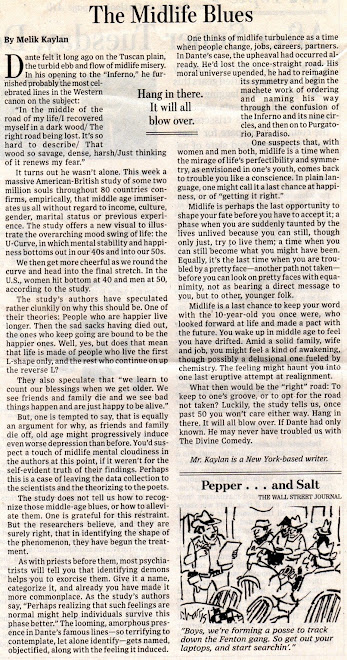January 29, 2013
Prospecting: A Lost Art?
My last post, "Why Producers Fail?" resulted in many requests for further information and specific requests for help. The most popular feedback had to do with prospecting - how to do it, who should do it, and so on. I will address prospecting in this article.
Many of you already know my feelings about this and the need for a division of responsibility in the sales department. It's a proven fact that the number of sales people who can do prospecting, relationship building AND closing equally well is very rare. And those who can are usually the owners of insurance agency!
So just what makes a good prospector and what are the keys to success in this area? Here is a brief list based on my interactions with many of WDC metro's insurance producers over the past ten years:
1. Personality: If you don't have the personality for sales, you will forever swim upstream. My wife is a great example: She is not only brilliant, but also meticulous, understanding, and a great problem solver, but she is introverted and does not enjoy picking up the phone to call strangers. Hey, she is standing here right now and just chimed in, "I admit, I'm afraid of rejection." I still love her! My point is to make sure your producer (or prospector) has a personality in alignment with prospecting. We give all of our candidates personality profiles which are specifically benchmarked for the minimum threshholds for high dominance, high extroversion, and low patience which are the basic predictors for prospecting and cold calling. Personality profiles do not lie.
2. Blocks of time: my son played big time college football and I had the opportunity to discuss how he plans his practices throughout the season since it seemed like there were so many moving parts to a practice depending on positions and time limitations. He explained that everyone worked in 'blocks of time' with no 'block' longer than 45 minutes. I heard later that Bill Parcells used the same system of blocks of time - he would plan his entire day in blocks of time. There is a best selling book called, "The Eight-Hour Work Week." Same principle. My point is to organize your prospecting time in blocks of time. Our internal cold-calling block in our office for my recruiters is 9 - 11AM and then 1 - 3PM. No email, no outside calls, no social media, no nothing! Just outgoing cold calling. It's been proven that multi-tasking is highly overrated.
3. Touches: the experts will tell you that you need to touch a customer 3 to 5 times to make a sale. I believe in our industry that number is closer to five. A phone touch is best, but email is effective too. Spread them out to once per 30 days so that you can complete the cycle in 120 days or so.
4. Measure Results: Keep accurate records of these blocks of time. This was discussed in the last blog, but it is very important to measure progress. Once you have the metrics down, it is simply dialing the phone or sending out the email. Let the numbers work for you.
5. Script & Roleplay: develop a script and review it with another successful producer or manager in your office. It should be short, concise, and definitely less than 50 words. Practice with other people (roleplay) and have them throw up obstacles for you to overcome. Then re-write it again. To be really successful with a script, you must practice to the point of becoming fluent. Several years ago, one of my most successful recruiters used to lock herself in her office and would tape herself, rewrite, tape, rewrite...it worked.
6. Walk-away: learn to sort out the qualified from the unqualified based on your pitch. You have to be ruthless to not spend your time with potential customers who are obviously not interested. Learn to walk away. You have enough friends already.
7. Get a good list: You've heard of "garbage in garbage out". Same thing in prospecting. You absolutely have to have a good prospecting list to start with. Otherwise, you will become dispirited very quickly and burn out. There are firms that specialize in these lists. Use them. A good list is worth its weight in gold. Try your industry association for whatever industry sector you are focused on. Chambers have them too.
That's it for now. Thanks for reading and let me know if you need any assistance with prospecting. Glad to help!
Subscribe to:
Post Comments (Atom)





No comments:
Post a Comment